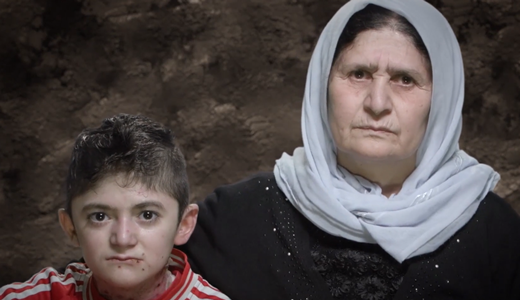We hardly go a week—or even a day—without news reports of horrific happenings somewhere in the world. Often they involve terrorism at the hands of Islamic extremists. And often they take place in the Middle East.
For those of us who don’t live in that region, it’s easy, I think, to grow calloused and numbed to yet another report of such strife. What can we do? we might wonder. I have to confess that my own heart has been a bit numbed by such stories. Bombings. Killings. Atrocities. Attacks. It can just seem never-ending.
But what does it feel like for Christians (and other persecuted minorities) who actually live there? For those forced to flee in the night, often in terror, leaving everything behind? For those grappling with haunting memories of what they’ve endured?
The film Faithkeepers, co-produced by Roma Downey, takes a sobering, clear-eyed look at the reality faced by Christian believers in many places in the Middle East today. This hour-long documentary (which is being screened in churches across the country on Tuesday, May 23, as well as some other dates later this summer) narrates (sometimes with shadowy, animated dramatizations) the harrowing tales of survivors—survivors who often only managed to escape after being tortured, raped or forced to watch their loved ones die. One woman who escaped said of her family’s ordeal, “After my son saw his father’s beheading, he stopped speaking.”
Faithkeepers intersperses such stories with commentary from individuals working to raise awareness about the plight of Christian persecution in the Middle East. Former Virginia congressman Frank Wolf, cofounder of the 21st Century Wilberforce Initiative, says:
What is taking place in the Middle East, particularly in Iraq, is genocide. It meets the official definition of the United Nations, that is the eradication of a particular ethnic or religious group. And they are facing extinction.
Indeed, the film documents the grim statistical reality of Christianity in its historical homeland. In 1915, Christians comprised 20% of the population of the Middle East. By 2015, they were just 4%. A million Christ followers have fled Egypt since the 1980s. Another million have left Iraq in the last 10 years. And 700,000 from Syria have sought to escape the violence and bloodshed there in just the last five years.
The Christian flight from the region mirrors that of the Jewish people, we’re told, throughout the first half of the 20th century. Jews were forced from Syria around 1900, from Yemen in 1914, from Egypt in the 1920s, Lebanon in the 1930s and Iraq in 1932. Rabbi Marvin Hier says of the current, similar pattern involving Christian persecution, “If we don’t care now, the statistics later will be mind-boggling.”
It’s easy to get wrapped up in our own lives and the individual struggles we all may face. But watching Faithkeepers put the kinds of things I often complain or worry about in a radically different perspective.
The film also challenged my temptation to just escape into the world of entertainment. And these days, the choices we have there—whether through movies, TV, video games, music and the internet—are functionally limitless. There’s nothing wrong with enjoying an engaging fictional story. Sometimes, though, we need to engage with the hard realities of the world God has placed us in. Especially the fact that life can be very, very hard for many believers trying to cope with persecution in the Middle East.
Faithkeepers isn’t easy to watch. (Nor is its unvarnished look at this painful subject matter suitable for young children.) But the challenge to get involved that it presents is worth grappling with. In the end, this moving documentary left me pondering the uncomfortable-but-important question, “What is my responsibility here?”
Faithkeepers offers a poignant, powerful reminder that even though none of us can single-handedly stop the genocide faced by many Middle Eastern Christians, together we can still make a real difference by supporting the organizations ministering to these desperate, displaced members of the body of Christ.






Recent Comments